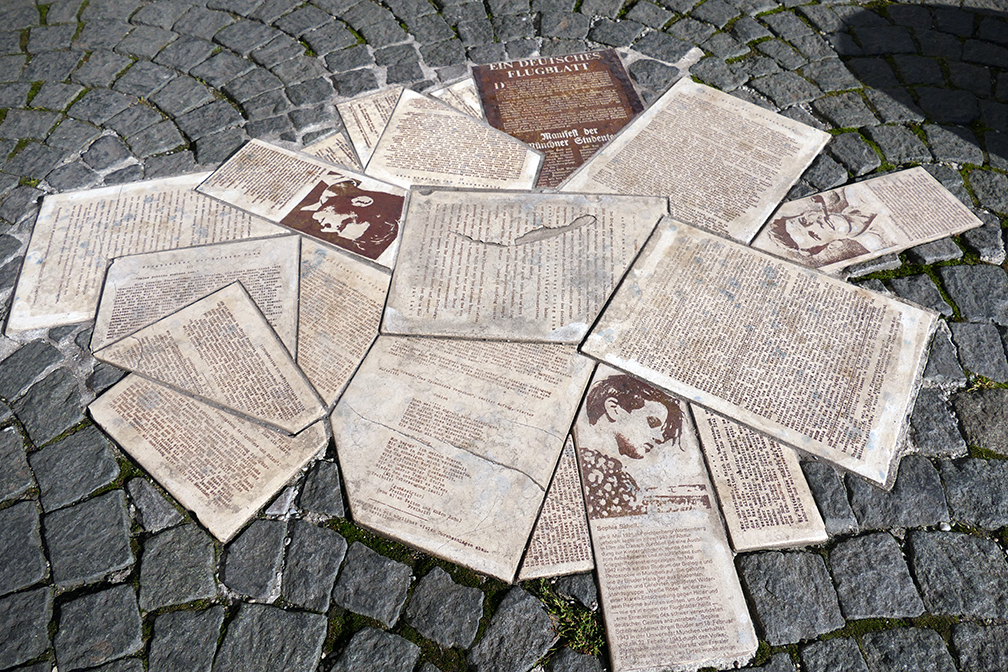White Rose Exhibit Commemorates Student Resistance Against Hitler
March 8, 2018

The German Program and the University Libraries will host a traveling exhibit, “The White Rose: The Student Resistance against Hitler, Munich 1942/43,” March 13–30 in the fourth-floor commons of Newman Library.
The exhibit opening includes a guest lecture on March 13 at 7 p.m. by University of Virginia professor Manuela Achilles, “Speaking Truth to Power: The White Rose Then and Now.” A reception will follow at 8 p.m.
The White Rose exhibit illuminates the activism of the 1942–1943 resistance group White Rose, a group led by five brave college students and their inspiring professor from the University of Munich.
The White Rose composed, printed, and distributed six pamphlets expressing their disgust with the Nazi regime and its atrocities. Seventy-five years ago in February 1943, the inner circle of the White Rose was arrested and sentenced to death. Many supporters were arrested and given long prison sentences. The White Rose never used violence and inspired resistance fighters across Germany until the end of the war.
The exhibit consists of 47 text and image panels describing the genesis of the White Rose, its resistance actions, its connections to other resistance groups, and its ultimate destruction by the Nazi regime. In addition to the panels, it provides suggestions for further reading and the opportunity to leave written impressions and reactions electronically at a computer reserved for the exhibit. The White Rose traveling exhibit is a version of a permanent exhibit on display in Munich.
“I first encountered the White Rose as a teenager,” said Esther Bauer, an associate professor of German at Virginia Tech. “In the 1980s, there were several publications about the group and some of its individual members in Germany, and I was fascinated with their determination, as they risked their lives for what they believed was morally right.”
Bauer worked to bring the exhibit and the guest speaker to Newman Library because, she said, current students can relate to the White Rose members, who were about their age.
“These young men and women were not larger-than-life figures, but the kind of students one might have met in lecture halls and seen chatting in the university’s courtyards,” said Bauer, who also directs the German program in the Department of Modern and Classical Languages and Literatures. “Given current social, cultural, and political developments in many countries, remembering the impact individuals can have is important. Looking at historical events can help us better understand the present, and preserving and sharing the memory of the White Rose can offer insights into the workings of resistance to injustice and inhumane policies.”
“Since the University Libraries serve the entire university, it is a great place to host exhibits like White Rose,” said Scott Fralin, exhibit program manager and learning environments librarian for the University Libraries. “Students, faculty, and staff from all departments and backgrounds use the library, so this exhibit will have an impact on a diverse cross-section of the campus. Hosting exhibits in Newman is also a way to provide new learning experiences for the people who use the library. When students study at the library, they have opportunities to learn about topics they might not otherwise become aware of, such as the White Rose.”
The traveling exhibit is provided by the White Rose Foundation e.V. of Munich, a nonprofit organization dedicated to the memory of the White Rose. The exhibit is sponsored by the Virginia Tech departments of History, Modern and Classical Languages and Literatures, Political Science, and Religion and Culture; the Center for Peace Studies and Violence Prevention; the Women’s and Gender Studies Program; the Alliance for Social, Political, Ethical, and Cultural Thought (ASPECT); and the College of Liberal Arts and Human Sciences.
Written by Ann Brown







